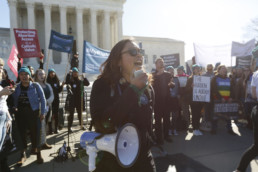Are the new abortion bans “the last gasp of patriarchy”?
It’s only April, but state lawmakers have already introduced over 500 bills restricting abortion—500!—in 2021 alone. Many of the bills are in the same states that are passing voting rights restrictions and LGBTQ bans—and all these proposals disproportionately affect Black and brown women.
What’s the connection between these various assaults on human rights? Why are they escalating now—and how can we stop them? Those are the questions on the table this week on UNDISTRACTED, as Brittany Packnett Cunningham sat down with Alexis McGill Johnson, president and CEO of Planned Parenthood Federation of America and the Planned Parenthood Action Fund.
Planned Parenthood, which provides health services to 2.4 million people each year, recently released a report showing that restrictions and bans on medication abortion have tripled in 2021 (when compared to the same period in 2019), while anti-abortion constitutional amendments have more than tripled. And there are 17 or 18 cases right now that “are literally one step away from the Supreme Court taking them up,” McGill Johnson says in the episode. “Any one of them could gut Roe.”
Packnett Cunningham and McGill Johnson break down how the right to abortion—popular in most states—became so endangered. This wave of anti-abortion bills may be the “last gasp of patriarchy,” as McGill Johnson says, but that doesn’t make it any less menacing: If Roe is overturned, “25 million women of reproductive age would be impacted.” Highlights and action items from their conversation include:
McGill Johnson on the connection between white supremacy and abortion: “White supremacy is ultimately about reinforcing racial hierarchy and patriarchy and misogyny. And what we are seeing is a group of largely white, male legislators in states where access to abortion is actually popular, but they are using their power to control the bodies of, largely, people of color. They are a hundred percent clear that they don’t even worry about the political impact of making these decisions because they feel that they can get away with it because the impact is largely on people of color.”
McGill Johnson on how abortion rights are human rights: “What upholds white supremacy is dehumanization. That is the strategy, right? Telling people that they are ‘less than’ if they are LGBTQ, ‘less than’ as a member of a BIPOC community; they are not human if they are trans or non-binary. And I think that to me, the first fight is really around restoring that humanity. And that is actually a fight around justice—that is a fight around making those claims on humanity. And then I think that freedom fight is really about restoring the rights ’cause you can’t confer rights, you can’t confer freedom on people that you don’t think are human.”
McGill Johnson on what the future holds for abortion rights in this country: “I keep saying, 2021: We’re in the locker room; it’s halftime. We’re coming out for the next 10 years, because yes, both Congress and our White House, are pro- sexual and reproductive health majorities, and we are working incrementally to issue change—whether that is from Title X to fighting to make sure that we can repeal Hyde.”
Packnett Cunningham on the ability to control your body as one of the most critical expressions of freedom: “There is nothing more important than our ability to have full agency over ourselves—whether or not that’s about ending police violence and state-sanctioned murder, or the ability for people who get pregnant to be able to make their own decisions about their own bodies. It is why, especially as a Black woman of faith, I am unapologetically pro-choice. My ancestors fought too hard and too long for me to be able to control my body.”
Listen on Apple Podcasts, Spotify, Stitcher or wherever you get your podcasts.
The abortion landscape may be “dire,” but there’s also action—and ways we can all get involved. At The Meteor Fund’s recent workshop on reproductive rights and justice, Slate’s Dahlia Lithwick offered her “Yellowstone Park rule” as a starting point. Host of the podcast “Amicus” about law and the Supreme Court, Lithwick argues that the Supreme Court is influenced by public opinion so it’s critical to stay loud on issues.
“Being visible is the single most important thing we can do,” Lithwick said. “This is the Yellowstone Park rule: You have to be bigger than the bear. You have to be massive when you come across a bear. My experience [suggests this] is the reason the Supreme Court right now is not taking one of these completely bonkers voting-rights cases is because they see us.”
The panelists got into everything from the coming wave of laws affecting young people’s rights to Justice Amy Coney Barrett’s take on fertility treatments. You can read the key learnings in The Meteor Fund’s wrap-up.
